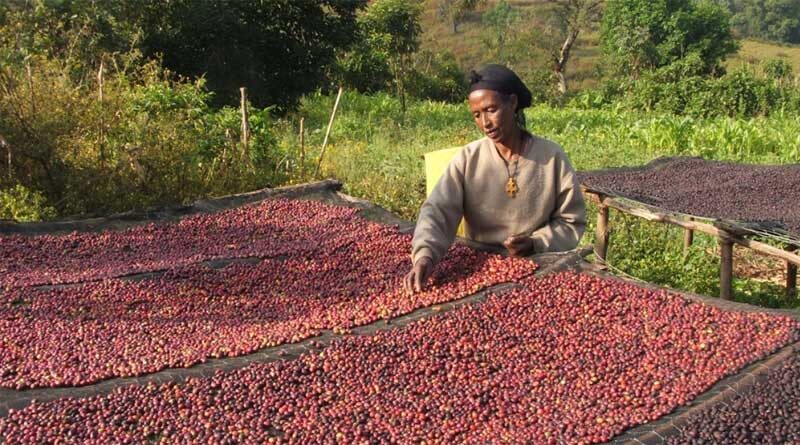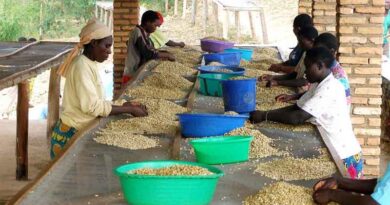Effects of credit guarantee scheme in opening up lending to smallholder coffee cooperatives in Ethiopia examined
20 August 2021, Africa: CABI coffee value chain experts have led new research which examines the effects of a partial credit guarantee scheme in increasing lending to credit constrained farmer cooperatives in Ethiopia – Africa’s largest coffee producer and the world’s third and fifth largest producer and exporter of Arabica coffee, respectively.
The study, conducted in the Oromia and SNNP regions – which account for 99% of the coffee produced in Ethiopia – and published in the journal Development in Practice, revealed that while the credit guarantee scheme improved financial additionality among the cooperatives in eight zones of the two major coffee-growing regions of Ethiopia it had limited reach and impact on the terms and conditions of loans.
Coffee is a key commodity to the economy of Ethiopia with around a quarter of the total export earning coming from coffee and an estimated 15 million of the population rely on some aspect of coffee production, processing or marketing for their livelihood.
Also Read: Verdesian rapidly expands into India with new products and experienced people
Lead researchers CABI’s Dr Negussie Efa Gurmessa, Scientist and Country Programmes Manager, and Dr Morris Akiri, Senior Regional Director, Africa, highlight that factors related to borrower cooperatives, lending banks, scheme design and operation, regulatory and business environments all affect the scheme’s effectiveness.
The scientists, which included Dr Charles Agwanda from CABI and Dr Catherine Ndinda of the Human Science Research Council, South Africa, conclude that their findings call for broader interventions that enable loan guarantees to be effectively utilised to generate the desired outcomes of greater coffee production and profitability.
Credit: Negussie Efa Gurmessa
In order to address gaps in the financial market, a five-year partial credit guarantee scheme (with 50% risk-sharing) was implemented in Ethiopia (2011-2016) with the aim of improving smallholder coffee cooperatives’ access to bank loans. The scheme integrated capacity building for the lending banks and borrower cooperatives.
The Common Fund for Commodities was the main financier and guarantor, while CABI and Ministry of Agriculture (MoA, Ethiopia), respectively, were the project executing and implementing agencies. Rabobank was involved partly in financing and risk-sharing, and Cooperative Bank of Oromia (CBO) participated in the guaranteed lending.
Dr Negussie Efa Gurmessa, said, “We found that most of the design features of the scheme are in line with international practices but its operation has some drawbacks which affected its up-take and utilisation among the lending banks.
“Integration of capacity building and technical support for the lending banks and borrower cooperatives was identified as one of the merits of the scheme. However, the partial credit guarantee scheme had limited influence on the lending banks’ behaviour and practices to adapt and/or relax their lending approaches, loan terms and products.”
The researchers also discovered that both internal and external factors affect the effectiveness of the guarantee scheme targeting farmer cooperatives. Particularly, weak business and financial management capacity of the cooperatives had limited their effective uptake and utilisation of the guaranteed loans.
Dr Akiri said, “This underscores the need to support primary cooperatives to build such capacities, which may involve acquiring professional managers and finance personnel. Supporting cooperatives in accessing attractive and reliable markets could also help in substantially improving access to loan finance and its repayment.
“Moreover, if such rural-based farmers’ cooperatives have to have easy and timely access to suitable loan products, the participating banks need to revisit and improve their lending terms and requirements.
“In this regard, identifying and integrating other attractive financial and non-financial incentive packages may motivate the lending banks.”
The scientists conclude that in view of their nature and the social and economic benefits they render to the farming community, farmers cooperatives may need to be treated differently in accessing financial resources.
“This requires creating favourable policy and regulatory environments that would enable banks to effectively reach out to smallholder cooperatives with suitable loan products,” Dr Negussie Efa Gurmessa added. “This may include policy measures that enforce mandatory lending of a certain proportion of banks’ loan portfolios to such marginalised groups, including cooperatives and small-scale agriculture.”















